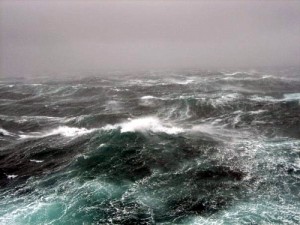You’re all set for a great day on the Great Barrier Reef. Dive gear, check; sunscreen, check; Hat and sunglasses, check. And then a quick check of the weather report. Winds: Easterly about 20 knots, tending south-easterly 20 to 25 knots in the middle of the day. Seas: Around 1 metre. Swell: Easterly 1.5 to 2.5 metres Weather: Partly cloudy, 26 degrees, possible rain. For those in the know, that weather report has the potential for one added item to the list: Seasick medication. The effects of seasickness can have a huge impact on any boating trip, so we here at Passions are going to separate some seasickness myths from the facts, laugh off a couple of old remedies, and spell out plainly what you can do to prevent or remedy seasickness before you come out on your reef tour.
Seasickness is a form of motion sickness characterized by a feeling of nausea and, in extreme cases, vertigo, experienced after spending time on a craft on water. This condition is caused by the rocking motion of the craft. Most people tend to concentrate on the inner surroundings of the vessel, or close their eyes and try to sleep. This will cause the worst effect of the disturbance. The brain receives conflicting signals: while the eyes show a world that is still, our body, and in particular the equilibrium sensors located in our ears, send signals of a moving environment. This discordance causes the mind to send to the whole body a general alarm signal, in order to stop all activities, in particular the most complex of all, the digestion process. If the motion does not stop, the brain will come to the conclusion that the individual is hallucinating and further conclude that the hallucination is due to poison ingestion. The brain responds by inducing vomiting, to clear the supposed toxin.
Seasickness has afflicted humans since the first person built a boat and shoved off the shore. With this long history, several myths about curing seasickness evolved, many seemingly more concerned with providing entertainment for fellow passengers, rather than alleviating the person’s suffering. These remedies, hailing back from the 1600s, included gently slapping the face of the Captain with a flounder three times, drinking a glass of iced water whilst standing on one leg and then singing God Save the Queen (Australian seafarers reported equally good results with Waltzing Matilda) and lastly, a long-time favourite, having a wee tot of Navy Rum before bed the night before setting sail. Unsurprisingly, none of these remedies reliably work.
So rather than old wives’ tales, there are some more practical remedies available for the prevention and treatment of seasickness during your trip out to the reef. Some try to go the natural route, and many passengers swear by nibbling on green apples, while some take ginger tablets. Others get a bit more scientific, and buy wrist bands or pressure pads for behind the ears that put pressure on certain spots. The majority of people will take some sort of medicated tablet, such as Travelcalm, Dramamine, or Gravol. Many people use a bit of prevention the night before, and will avoid excess alcohol or heavy/spicy foods. On the day, if possible avoid strong food odours and other unpleasant smells. If you start to feel ill once you’re on the boat, you still have a few options. Avoid reading, and if you start to feel ill inside, head outside in the fresh air. If you know you get very ill on boats, you can also get an anti-seasickness injection from a doctor a couple of days before travelling.
Hopefully, this knowledge will come in handy and you can enjoy your trip out to the reef. If you are looking to make a booking, feel free to ask our friendly reservations staff about the weather conditions and get some advice on what the seas will be like. Regardless of the conditions, rest assured that our friendly professional staff will be there to look after you. Welcome aboard and Bon Voyage !
!
